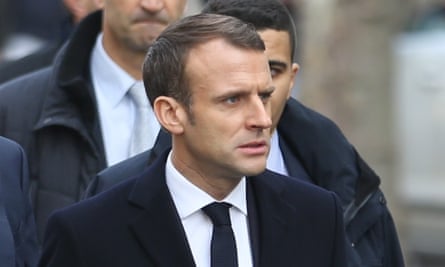The French government has bowed to gilets jaunes (yellow vests) protesters and abandoned the fuel tax rise that has sparked more than three weeks of violence and seen parts of central Paris in flames.
Just a day after announcing a six-month freeze on the eco-tax, the Elysée Palace declared it was dropping the measure from the 2019 budget.
Hours earlier, the prime minister, Édouard Philippe, had said his government was prepared to reconsider the tax if other solutions could be found to make the transition to cleaner fuel without hitting people in their pockets, as he spoke to MPs during a debate on next year’s finance bill in the Assemblée Nationale.
In a statement on Wednesday evening, the Elysée said that Philippe and the president, Emmanuel Macron, “both wished the increase in the carbon tax be removed” from the budget for 2019.
“The citizen and parliamentary debate in the coming weeks and months will have to find solutions and funding that will meet the challenges of the ecological transition; solutions that will preserve the purchasing power of our citizens,” it added.
François de Rugy, the minister for ecological change, told a French TV news channel he had spoken to Macron to confirm that the eco-tax had been “cancelled for the year 2019”.
De Rugy added: “I had the president on the telephone a few minutes ago. He told me: ‘People have the impression there’s some sort of trick, that it has been suspended but it will come back afterwards.’”

However, Macron has ruled out a return of the impôt de solidarité sur la fortune, or solidarity tax on wealth (ISF). The president reportedly told a meeting of the council of ministers on Wednesday: “We’re not going to unpick anything we’ve done in the last 18 months.”
Lifting part of the ISF was a pillar of Macron’s election campaign and one of the first fiscal measures he implemented on taking power in May 2017, leading to his nickname “president of the rich”.
Macron earlier called on all political, social and business leaders to issue a “clear and explicit” appeal for calm as France faced a new round of the gilets jaunes protests which are threatening to destabilise his presidency.
The gilets jaunes have called for further protests, while hauliers are being urged to strike and farmers have announced plans for demonstrations next week.
Speaking to the Assemblée National on Wednesday, a government spokesman, Benjamin Griveaux, told MPs: “Emmanuel Macron asks all the political and union organisations as well as business leaders to issue a clear and explicit appeal for calm.”
Griveaux added: “What we are living through is no longer political opposition, but opposition to the republic.”
The government was forced into a change of direction after last Saturday’s scenes of running clashes with police, torched cars and buildings, and smashed shop fronts in one of Paris’s most exclusive areas, as well as damage to the Arc de Triomphe in a third week of protests.
Before Wednesday evening’s announcement that the eco-tax rise was being abandoned, representatives of the gilets jaunes movement, which has no official organisation or leadership, dismissed the government’s concessions as too little too late.
Various gilets jaunes organisers have called for wider social reforms, including a rise in the minimum wage and higher taxes on international companies such as Google and Amazon.
Easing the ISF for the wealthy was described by one political commentator as Macron’s “original sin” and has been regarded as socially divisive at a time when French workers have felt increasingly squeezed financially.
The ISF was imposed on those worth more than €1.3m (£1.2m) including their main residence. It has been replaced by the impôt sur la fortune immobilière (ISI), which in effect lifted or reduced the tax on certain properties, share portfolios and life assurances.
Last year, Philippe said the move would make the country more attractive to investors and stop wealthy people leaving France. The ISI came into effect in January and Griveaux has said it will take 18 to 24 months to see if it brings in more revenue.
The gilets jaunes have been calling for another day of action on Saturday while trying to organise some kind of popular leadership. Previous attempts have led to threats being made against protesters putting themselves forward to give media interviews or meet elected representatives.
André Lannée suggested organising Facebook referendums to elect two gilets jaunes representatives for every region.Once elected, he said, the group could then propose new legislation.
“We will arrive at the Elysée with a demand. It will be an official delegation, legitimate as it has been elected by popular referenda. We are not going to smash anything up, there is no interest in smashing up our country.” He concluded: “We let nothing go; we continue.”
Across the country, protests and blockades by high school students opposed to plans to introduce criteria for university entrance – at present it is open to anyone with a baccalauréat pass – added to the air of crisis and insurrection in France.
The Chamber of Commerce and Industry claimed 142 shops and businesses had been seriously damaged by last Saturday’s clashes in central Paris. An additional 95 were less seriously damaged.
France’s main unions are planning a joint meeting on Thursday and transport leaders are to meet the government minister Élisabeth Borne after calls for a hauliers’ strike from next Sunday.
Blockages at petrol refineries have led to fuel shortages in certain regions and gilets jaunes continue to block a number of refineries, roads and commercial centres.
Recent polls reflect conflicting findings: an IFOP survey found 72% of people in France support the gilets jaunes movement but not the violence. Another poll by BVA found 70% of people thought the freeze in the fuel tax rises should mean the end of the protests.
An IFOP poll showed Macron’s popularity had dropped to a new low of 23%.
